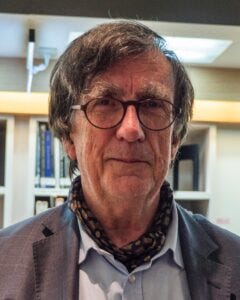Tuesday 11 October, 2022
On reflection…
Seen in the lake on a walk yesterday afternoon.
Quote of the Day
”The world is not a solid continent of facts sprinkled by a few lakes of uncertainties, but a vast ocean of uncertainties speckled by a few islands of calibrated and stabilised forms.”
Bruno Latour
Musical alternative to the morning’s radio news
Duke Ellington | Across the Tracks Blues
Magical (IMHO)
Long Read of the Day
Audiobooks: Every Minute Counts
Absolutely fascinating blog post from Public Books explaining why audio books are a strangely interesting product (or should I say ‘service’?) I don’t use them, but I have friends who do. And there are lots of interesting observations in the post, which is why I thought it would make an admirable Long Read, but not a Long Listen!
Bruno Latour RIP
One of the most interesting thinkers of our era has died. I knew him only slightly — through a mutual friend, the eminent Dutch philosopher Gerard de Vries — but admired him greatly; indeed, tbh, I was slightly in awe of him, and always sat up when the occasional email from him arrived in my inbox.
Gerard knew Latour long before he was cool, and after he had retired from his Chair at the University of Amsterdam he wrote a magnificent introduction to his friend’s work. Given the scope of that work, it was quite an achievement to encompass it in a single volume, and I was so impressed by it that we invited the author — and his subject — to come to a public launch of it in CRASSH, the Cambridge research institute in which our Centre for Technology and Democracy is based.
The event was a sellout, and in the end we had to arrange a live relay to several other rooms in the building to cope with the crowd. The only other speaker I can remember having such a powerful magnetic impact was Noam Chomsky many moons ago.
Among other things, Bruno was a formidable multitasker, with a baffling capacity to do several difficult things simultaneously: attending a seminar, for example, while writing a paper on his laptop — and yet suddenly asking a pertinent question to a speaker who had foolishly assumed that his mind was elsewhere. In that sense, he was reminiscent of Norbert Wiener, who used to have a similarly discombobulating effect on seminar speakers at Harvard in the 1940s.
Stuart Jeffries wrote a nice obituary of Bruno in yesterday’s Guardian. “His big idea,” Jeffreys writes,
developed in more than 20 books, theatrical performances and art installations, as well as his 2013 Gifford Lectures in Edinburgh, entitled Facing Gaia, was not that difficult to grasp. We should realise we are not the selfish individuals predicted by neo-liberal economic theory, but social beings living interdependently with other organic life, and that, like his favourite insects, we must productively recycle our waste and consume little.
His ideas were profoundly influenced by the Gaia theory of the maverick British scientist James Lovelock, wherein the Earth is a self-regulating organism. Latour’s sense was that it is the critical zone, rather than the whole of our planet, that should be the object of human concern and care, in order to reverse the despoiling impact of what he and others called the Anthropocene, the epoch in which humanity has become tantamount to a geological force and presided over the sixth mass extinction event.
He was a life-enhancing thinker and a very nice man. May he rest in peace.






